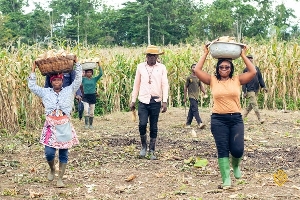- Home - News
- TWI News | TV
- Polls
- Year In Review
- News Archive
- Crime & Punishment
- Politics
- Regional
- Editorial
- Health
- Ghanaians Abroad
- Tabloid
- Africa
- Religion
- Election 2020
- Coronavirus
- News Videos | TV
- Photo Archives
- News Headlines
- Press Release
General News of Friday, 5 November 2010
Source: GNA
National mass measles going on smoothly
Accra, Nov. 5, GNA - The four-day nation-wide mass measles vaccination programme is progressing smoothly with parents and guardians sending their children and wards to immunization centres. The mass vaccination programme, which is targeting children aged between nine months and five years, is expected to reach at least 90 per cent of children in the country to prevent the transmission of measles. Some communities have reported 30 per cent coverage after the first day of the exercise on Wednesday.
The three-day exercise is targeted to protect about 4.5 million children from measles.
Ms Elizabeth Nunoo, Principal Nursing Officer of the Reproductive and Child Unit, Osu Klotey Sub-Metro in Accra, who is stationed at the Adabraka Polyclinic, on Thursday confirmed encouraging patronage of the exercise at the Polyclinic in an interview with the Ghana News Agency. She said the children were also given a dose of Vitamin "A" to boost their immune system against other illnesses.
Ms Nunoo said vaccines and all other medical supplies were received on schedule to allow a smooth take-off and officials in charge of the exercise had not reported any problems. She, however, could not give the exact number of children who had been vaccinated by 1000 hours on Thursday due to a technical problem. She said daily figures were submitted to the Accra Metropolitan Health Directorate. She appealed to the public to encourage parents and guardians to send their children for vaccination to save them from measles and other complications that may result from the disease.
Dr Iyabode Olusanmi, the representative of UN Children's Fund (UNICEF) in Ghana, joined a team of health workers and volunteers of Ghana Health Service (GHS) to immunize some of the children in the Accra Metropolis.
She said the exercise was part of efforts to maintain the gains in reducing morbidity from measles and reducing the under-five mortality rate towards achieving the fourth Millennium Development Goal (MDG 4). "Ghana in eight years has not recorded any measles deaths and the number of children who are affected by the disease has reduced considerably," Dr Olusanmi said.
She explained that the effect of measles on children presented very devastating complications, including brain problems, blindness, deafness, diarrhoea and sore throat leading to malnutrition and pneumonia.
The UNICEF representative therefore urged the government to follow the vaccination strategies to ensure high routine immunization coverage. Dr. Edwin Agyei, Deputy Director of Public Health of Ghana Health Service (GHS), said about 21,400 out of 65,000 children were vaccinated on the first day and expressed the hope that they would complete coverage after the exercise.
He said GHS would ensure the maintenance of the gains that Ghana had made over the past eight years to enhance efforts towards the achievement of the MDG 4.
Mrs Emma Antwi, Director of Regional Nursing Services, said vaccinations were being given at fixed and temporary sites, depending on the settlement of the population, public and private health facilities, schools, churches, mosques and in other institutions as additional posts.
Teams would also stay in areas for as long as would be required to complete the task and be utilised to ease access to hard-to-reach areas, she said.
Mrs Antwi said vaccines and all other medical supplies were received on schedule to allow for a smooth take-off, adding that officials in charge of the exercise had not reported any problems.
The Nima Community on Thursday witnessed an impressive turnout for this year's mass measles vaccination. In an interview with the Ghana News Agency (GNA), Mrs Hannah Ndabi, Principal Nursing Officer, Nima Government Clinic, said the exercise was very effective and the public were responding positively. She said 379 children, representing 33 per cent of expected children, were vaccinated on the first day. Mrs Ndabi attributed the positive response to the effective education carried out for the past two months, which created the platform for the public to be aware of the programme. She said a team of trained vaccinators had been stationed at vantage points like schools, communities and clinics. Some parents who spoke to the GNA lauded the exercise since it would improve health delivery.
Dr Kwadwo Antwi-Agyei, Programme Manager for the Expanded Programme on Immunization of the Ghana Health Service, has, meanwhile, expressed satisfaction with the massive turn-out for the on-going national measles immunization campaign.
Speaking to the Ghana News Agency in an interview, he said there were enough vaccines to cover the targeted number of children. The nationwide exercise is aimed at reaching about 4.5 million children between nine months and five years. It is under the theme "Measles can Kill, Immunize your Child Now". Dr Antwi-Agyei told the GNA that the exercise was having a challenge of some communities in the Northern and Volta regions, which had been cut off because of the heavy rains. "We are providing the officials there with life jackets to enable them to offer services for children in areas which have been cut off because of the rains and when it comes to the worst, we will get in touch with the Armed Forces for a helicopter to air lift them. But I do not think that it will get that far," he added. He said the health workers were currently using boats to cross the waters to the communities to administer the vaccines. Dr Antwi-Agyei appealed to parents, especially mothers, community, care- givers and opinion leaders, to send their children to designated centres for vaccination. A visit by the GNA to the Ridge Hospital saw health workers administering the vaccines to children. At the La General Hospital, vaccines were in abundance and hospital attendants the GNA spoke to said they did not envisage any shortage. 05 Nov. 10










